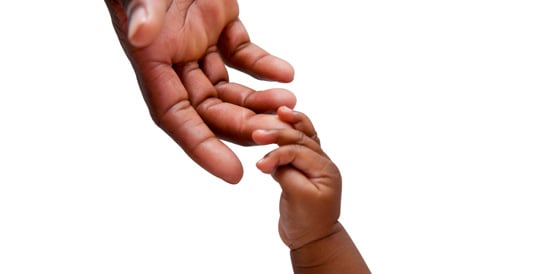Share Content
Article Link Copied
The Forest of Fatherhood

Two anthropologists and fathers ask, “How deeply does a man’s culture influence his fatherly biology, and what does it mean for his family?” To find answers, they travel to the forests of the Republic of the Congo where two cultures with dramatically different ideas on fathering live side-by-side.
Text: Adam Howell Boyette, Duke University
Lee Gettler, University of Notre Dame
It was midday. The sky was overcast. The tropical rain fell hard the day before, so the dust was down and the air felt fresh. We had just finished interviewing several Mbendjele parents about their ideas of fatherhood and had heard about a dance on the other side of the village. My companion, Valchy, a student from Brazzaville had never seen an Mbendjele dance, so we went to attend—everyone is always invited. The setting was familiar to me. It was the dance of Dzengi, the spirit of the forest. Two concentric circles of dancers, one of men within one of women, sang in polyphonic harmony as they followed the spirit, who spun and leapt, adorned in the bright green leaves of young raffia palm. Valchy was visibly amazed and disconcerted by the scene; chaotic and spontaneous, yet coordinated and practiced; young and old, men and women, dancing, singing, and drumming.
In front of us, in the midst of the throng following Dzengi, a woman carrying a sleeping infant handed it off to it’s father so she could dance unencumbered. He fluidly slipped the sling around his neck and placed the baby on his hip. Continuing to dance, he softly patted the rhythm on the sleeping child’s back. “Taye munye!” exclaimed our Mbendjele guide, joyfully dancing and singing nearby. Already attuned to the aims of our project, he was pointing to what we had just observed: “Taye munye”—“good father.” [Boyette’s field notes, 22 June, 2015]
New fathers show specific changes to their hormonal and brain function
This scene is common among the Mbendjele. As egalitarian hunter-gatherers, they value cooperation in almost every domain of life. This ethos shapes how parents fluidly share childcare duties, from collecting food to soothing a crying infant. In contrast, their Bantu neighbors, who farm on the periphery of the forest, hold a different set of expectations about men’s roles in childcare. Bantu fathers are heads of families—they are feared and respected. Father-child interactions are less common and more likely to be disciplinarian than indulgent. Focusing on these groups, our study explores how various beliefs regarding men’s roles in the family shape the biology of fatherhood. Some new fathers show specific changes to their hormonal and brain function that help prepare them for caretaking—at least in cultures where they share that role with mothers or others. Little is known about how fathers’ biology responds to parenting demands in cultures where they are not expected to hold, feed, or play with their children, nor if these differences in men’s roles and their underlying biology affect the physical and mental well-being of their children. This knowledge would help us understand how flexibly evolution has shaped men’s fatherly biology, but also how we might shape interventions or policy to help men be the fathers their children need.
Drawing on funding from the Jacobs Foundation, our project uses a “biocultural” anthropological toolkit to understand how facets of people’s environments, such as cultural norms and social systems, interact with their biological functions to affect behavior and, ultimately, health. We are also interested in understanding these interactions in diverse contexts. Most research on men’s roles in the family has been done in wealthy, Western societies—primarily the United States and Western Europe—representing a small slice of humanity and the ways men parent. Meanwhile, a growing number for studies, from diverse societies around the world have examined whether fathers and childless men produce levels of various hormones like testosterone. Yet, little is known about how different models of family life and men’s roles relate to these biological patterns or how biology, fathering behavior, and culture intersect to affect the health of children.
In Congo, little is known about fatherhood
For these reasons, we have gone to Congo. The project is an exciting chance to bridge our specific research interests and methodological skills. Gettler is a pioneer in the study of the biology of fatherhood and has devoted much of his career to understanding how men’s hormones change during the transition to parenthood and how those changes and men’s behavior as parents mutually impact one another. Boyette is an expert in hunter-gatherer child development, and has lived among Congo Basin hunter-gatherers and farmers for several years, studying how culture and ecology structure learning—including learning how to parent.
This year, we visited Mbendjele and Bantu communities to seek their consent and begin interviews. Next year, we will collect biological samples from fathers to see if their hormone levels differ based on how they interact with their children and how well they fit their community’s beliefs about a “good father.” We will also measure children’s health and well-being—because, ultimately, the goal of fatherhood for many dads is to grow thriving children. We think these results will reveal some of the complex pathways by which individual differences, culture and biology all contribute to fathers’ achieving this goal in diverse circumstances.